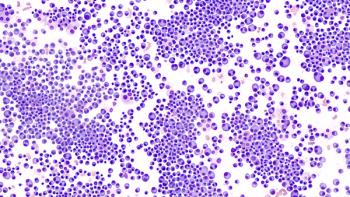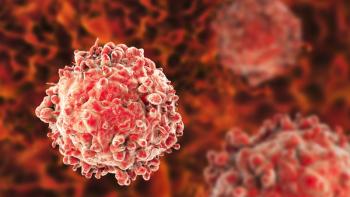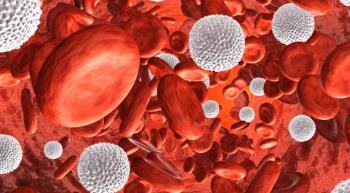
Early Evidence Shows Investigational Therapy-Chemo Combo May Be Effective in Acute Myeloid Leukemia
The combination of ficlatuzumab and chemotherapy demonstrated some promising results in a small group of patients with relapsed/refractory acute myeloid leukemia.
The investigational drug ficlatuzumab combined with chemotherapy showed signs of clinical efficacy in the treatment of patients with relapsed/refractory acute myeloid leukemia, according to data from an early-phase trial published in Blood Cancer Discovery.
The study authors observed a complete response to treatment in 9 of the 17 patients enrolled on the trial. Four of the patients who achieved a complete response showed no signs of minimal residual disease. The reported progression-free survival (PFS) among those who achieved a response was 31.2 months. An overall survival has not yet been reached.
Of note, 10 patients (8 of which achieved a response to the combination) received an allogeneic hematopoietic cell transplant. Six of those patients, according to a press release on the results, remain in remission as of the last follow-up.
“By comparing pre-treatment to post-treatment blood samples using state-of-the art single-cell mass cytometry and RNA sequencing, we observed that ficlatuzumab successfully suppressed (hepatocyte growth factor) signaling, and we also identified biomarkers of treatment response and resistance,” said the study’s lead author Victoria Wang, MD, PhD, an assistant professor of hematology and oncology at University of California, San Francisco, in the release. “This approach provided novel insight into the molecular changes that occur upon treatment, which could have clinical implications for tracking treatment response or identifying patients likely to respond.”
Peripheral blood mononuclear cells were collected at baseline and again at different timepoints after the initiation of treatment. These collections were analyzed for molecular changes as responses to treatment.
The data demonstrated that treatment with ficlatuzumab was associated with attenuated phosphorylation of MET, the receptor for the hepatocyte growth factor (HGF). This confirmed the on-target inhibition of HGF. Patients whose disease responded to treatment experienced reduced phosphorylation of the S6 protein and increased expression of genes involved in myeloid and leukocyte activation. Patients whose disease did not respond to treatment experienced increased HGF expression, increased phosphorylation of S6, as well as further expression of the genes involved in protein translation, cell adhesion and type I interferon signaling.
The most common adverse event (AE) that the study authors observed in the patient population was febrile neutropenia. There were two instances of a serious AE, and one death. However, that death was deemed to be unrelated to the use of ficlatuzumab.
The aim of the study was to assess the safety and efficacy of the investigational drug’s ability to target a shared chemical pathway in combination with single-agent chemotherapy in patients with relapsed/refractory AML. Ficlatuzumab, the investigational drug, is a monoclonal antibody that functions by binding HGF to prevent it from activating MET signaling and allowing tumor growth. Ficlatuzumab, according to the release, targets extracellular factors as opposed to cancer-specific mutations. This is important because many patients in this population have higher levels of circulating HGF.
The study authors noted that although the early findings show promise in this patient population, further research is needed to validate the findings from this phase 1 portion of the trial.
“The 53% response rate was quite striking to us since historical response rates for the standard-of-care treatment are in the 30% range,” senior study author Charalambos Andreadis, MD, a professor of clinical medicine at UCSF, said in the release. “While these results need to be validated in a larger study, they suggest that ficlatuzumab in combination with single-agent chemotherapy may lead to better responses with less toxicity in patients with relapsed/refractory (acute myeloid leukemia).”
Reference
EurekAlert News Release. Ficlatuzumab plus chemotherapy shows promise for the treatment of patients with relapsed/refractory acute myeloid leukemia. Published July 16, 2021. Accessed July 16, 2021. https://www.eurekalert.org/pub_releases/2021-07/aafc-fpc071421.php
Newsletter
Knowledge is power. Don’t miss the most recent breakthroughs in cancer care.































































































